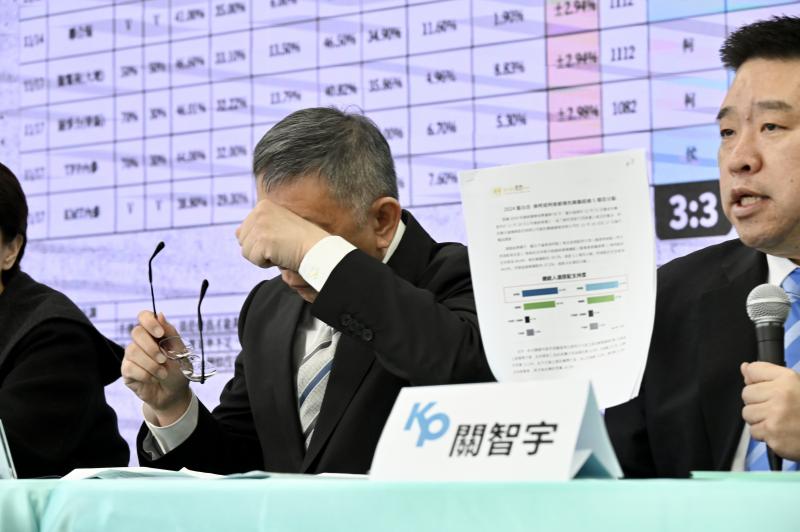The Chinese Nationalist Party (KMT) and Taiwan People’s Party (TPP) on Saturday failed to reach a consensus on a united ballot for the January presidential election due to disagreements over sampling error size and polling methodology.
The two opposition parties on Wednesday announced they were to use public polling to decide who would take the lead spot on the ballot, KMT candidate New Taipei City Mayor Hou You-yi (侯友宜) or TPP Chairman Ko Wen-je (柯文哲).
Each of the parties and former president Ma Ying-jeou (馬英九) picked an expert to analyze polls conducted from Tuesday last week to Friday, with the results to be announced at 10am on Saturday.

Photo: George Tsorng, Taipei Times
However, after discussion late into the night on Friday, the three polling experts failed to reach a consensus, Ma Ying-jeou Foundation director Hsiao Hsu-tsen (蕭旭岑) said.
The TPP representative protested using three of the nine selected surveys, leaving a stalemate over whether they should be included, Hsiao said, without specifying the issues cited.
If the six remaining surveys are analyzed using the statistical margin of error, five support a Hou-Ko ticket, Hsiao said.
However, if a 3-percentage-point margin were used as supported by the TPP, they would be tied at three apiece, he added.
According to their agreed criteria from Wednesday’s meeting, a result within the margin of error would count as a point toward a Hou-Ko ticket, meaning a larger sampling error size would favor the KMT candidate.
The experts have therefore recommended that discussions be continued at a later date, Hsiao said.
At a separate news conference later in the morning, Ko reiterated the importance of forming an opposition alliance.
Ko said he wishes to keep negotiating with the KMT, but could not allow a 6-percentage-point margin of error.
“It’s like asking us to surrender our weapons,” he said.
Asked whether this means the breakdown of an opposition coalition, Ko said that “anything is possible” until the window for candidate registration closes at 5pm on Friday.

US President Donald Trump yesterday announced sweeping "reciprocal tariffs" on US trading partners, including a 32 percent tax on goods from Taiwan that is set to take effect on Wednesday. At a Rose Garden event, Trump declared a 10 percent baseline tax on imports from all countries, with the White House saying it would take effect on Saturday. Countries with larger trade surpluses with the US would face higher duties beginning on Wednesday, including Taiwan (32 percent), China (34 percent), Japan (24 percent), South Korea (25 percent), Vietnam (46 percent) and Thailand (36 percent). Canada and Mexico, the two largest US trading

AIR SUPPORT: The Ministry of National Defense thanked the US for the delivery, adding that it was an indicator of the White House’s commitment to the Taiwan Relations Act Deputy Minister of National Defense Po Horng-huei (柏鴻輝) and Representative to the US Alexander Yui on Friday attended a delivery ceremony for the first of Taiwan’s long-awaited 66 F-16C/D Block 70 jets at a Lockheed Martin Corp factory in Greenville, South Carolina. “We are so proud to be the global home of the F-16 and to support Taiwan’s air defense capabilities,” US Representative William Timmons wrote on X, alongside a photograph of Taiwanese and US officials at the event. The F-16C/D Block 70 jets Taiwan ordered have the same capabilities as aircraft that had been upgraded to F-16Vs. The batch of Lockheed Martin

China's military today said it began joint army, navy and rocket force exercises around Taiwan to "serve as a stern warning and powerful deterrent against Taiwanese independence," calling President William Lai (賴清德) a "parasite." The exercises come after Lai called Beijing a "foreign hostile force" last month. More than 10 Chinese military ships approached close to Taiwan's 24 nautical mile (44.4km) contiguous zone this morning and Taiwan sent its own warships to respond, two senior Taiwanese officials said. Taiwan has not yet detected any live fire by the Chinese military so far, one of the officials said. The drills took place after US Secretary

THUGGISH BEHAVIOR: Encouraging people to report independence supporters is another intimidation tactic that threatens cross-strait peace, the state department said China setting up an online system for reporting “Taiwanese independence” advocates is an “irresponsible and reprehensible” act, a US government spokesperson said on Friday. “China’s call for private individuals to report on alleged ‘persecution or suppression’ by supposed ‘Taiwan independence henchmen and accomplices’ is irresponsible and reprehensible,” an unnamed US Department of State spokesperson told the Central News Agency in an e-mail. The move is part of Beijing’s “intimidation campaign” against Taiwan and its supporters, and is “threatening free speech around the world, destabilizing the Indo-Pacific region, and deliberately eroding the cross-strait status quo,” the spokesperson said. The Chinese Communist Party’s “threats